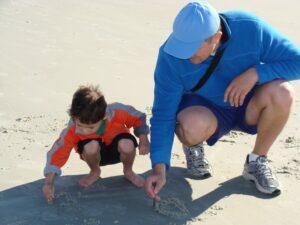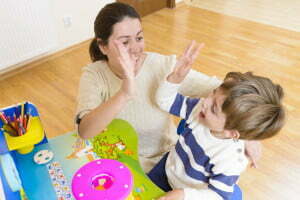En el post de la semana pasada hablamos acerca de los beneficios de ser feliz y cómo la felicidad le puede convertir en una persona más sana, agradable, e incluso generosa. Como padres, ¡es seguro que queremos todas estas cosas buenas para nuestros niños! Entonces, ¿cómo se puede ayudar a sus niños a ser más felices? Aquí hay un par de consejos:
- Ser feliz usted mismo/a. Siempre repetimos esto: Usted tiene que ser un buen modelo para sus niños. Entonces si quiere que entiendan lo que es ser feliz, ¡tienen que verle a usted haciéndolo! Y cuando está sintiéndose feliz, hable sobre sus sentimientos y cómo llegó a ellos, como “¡Guau! Cómo me encanta caminar al aire libre. Sentir que los rayos del sol calientan mi cara realmente me hace sentir feliz.” Es buenísimo cuando puede señalar a su niño/a cómo él o ella le hizo feliz. Por ejemplo, “Cuando colocaste tu plato en el lavaplatos, me hizo sentir muy contento/a, porque te acordaste de hacer exactamente lo que te dije.”
- Ayudar a su niño a reconocer las emociones. Aunque parece extraño, no nos nacimos con una comprensión de lo que significan las emociones. Al igual que aprendan el significado de palabras como “dinosaurio” y “superlativo”, los niños también tienen que aprender lo que significa sentirse feliz o triste o enojado/a. Usted puede ayudar a su niño a reconocer las emociones al leer libros sobre el asunto, al señalarlas en otros libros, y al ayudar a su niño a reconocerlas en sí mismo/a. Podría decir algo como “Veo que estás muy contento de comer helado porque veo ¡una sonrisa gigante en tu cara!” También ayuda a los niños el nombrar específicamente lo que le hizo sentir lo que está sintiendo. De esta manera puede aprender cuales tipos de cosas le hace sentir feliz o triste o enojado, como “Veo que te sientes triste ahora porque estás llorando. Me imagino que te sientes triste porque no podemos ver a tu amigo y lo extrañas.”
- Ayudar a su niño a aprender lo que lo hace feliz. Una vez que su niño puede reconocer cuando está feliz, ayúdalo a aprender cuales actividades le ayuda a ser feliz. Al igual que los pasatiempos pueden ayudar a los adultos a sentir felices, los niños deben aprender cuales actividades son interesantes y gratificantes para ellos. Puede ser que tengan que intentar algunas cosas. Así que inscriba a su niño en una clase de hip-hop, o construyan juntos unos edificios de Lego. Al simplemente pasar tiempo junto con su niño es probable que ambos se sentirán más contentos.
- Enseñar a su niño a resolver problemas y ver el lado bueno de las cosas. Nunca vamos a poder evitar que las cosas a veces salen mal para los niños. Sus amigos no siempre les tratarán bien y no siempre van a recibir exactamente lo que querían para la Navidad. Tienen que aprender a resolver problemas de una manera apropiada. También tienen que buscar lo mejor en una situación o persona. El poder encontrar el lado positivo de las cosas les ayudará a mantenerse positivos incluso en momentos negativos.
- Enseñar a su niño a seguir siendo curioso. Quizás se acuerda de nuestro post de la semana pasada que las personas felices tienen interés en el mundo a su alrededor. Así que enseñe a su niño a preguntar sobre las cosas y luego ir a buscar las respuestas.
Para más ideas sobre maneras de enseñar a su niño/a a ser feliz, vea este articulo fantástico de la revista TIME. Y recuerde, la mejor manera de crear la felicidad es sentirla en usted mismo/o y luego compartirla. ¡El hacer cosas que disfrutan con sus niños les dará la oportunidad de ver la felicidad en usted y de sentirse felices ellos mismos!
[divider type=”standard” text=”Go to top” full_width=”no” width=”1/1″ el_position=”first last”]
Image: © Andres Rodriguez| Dreamstime.com





